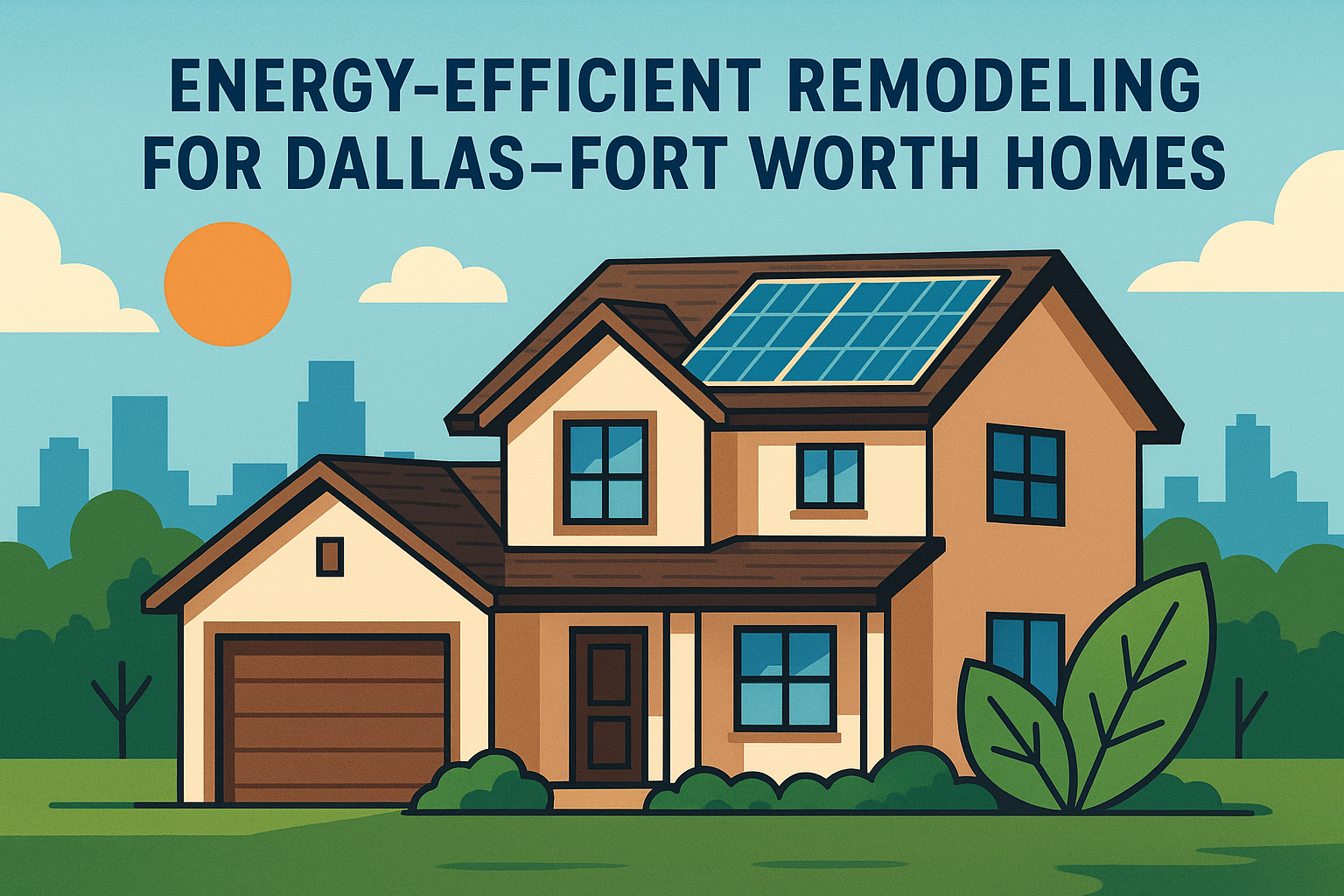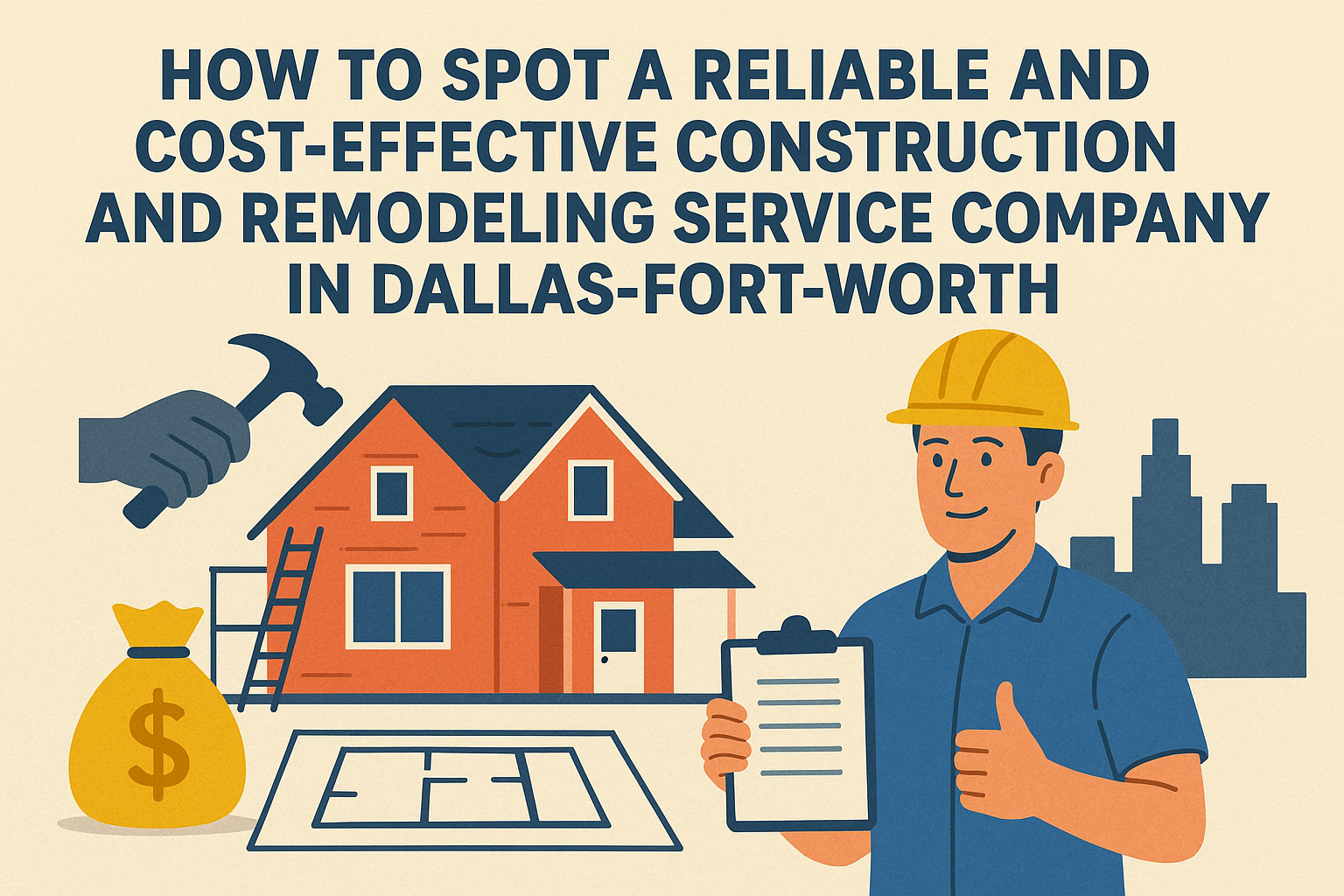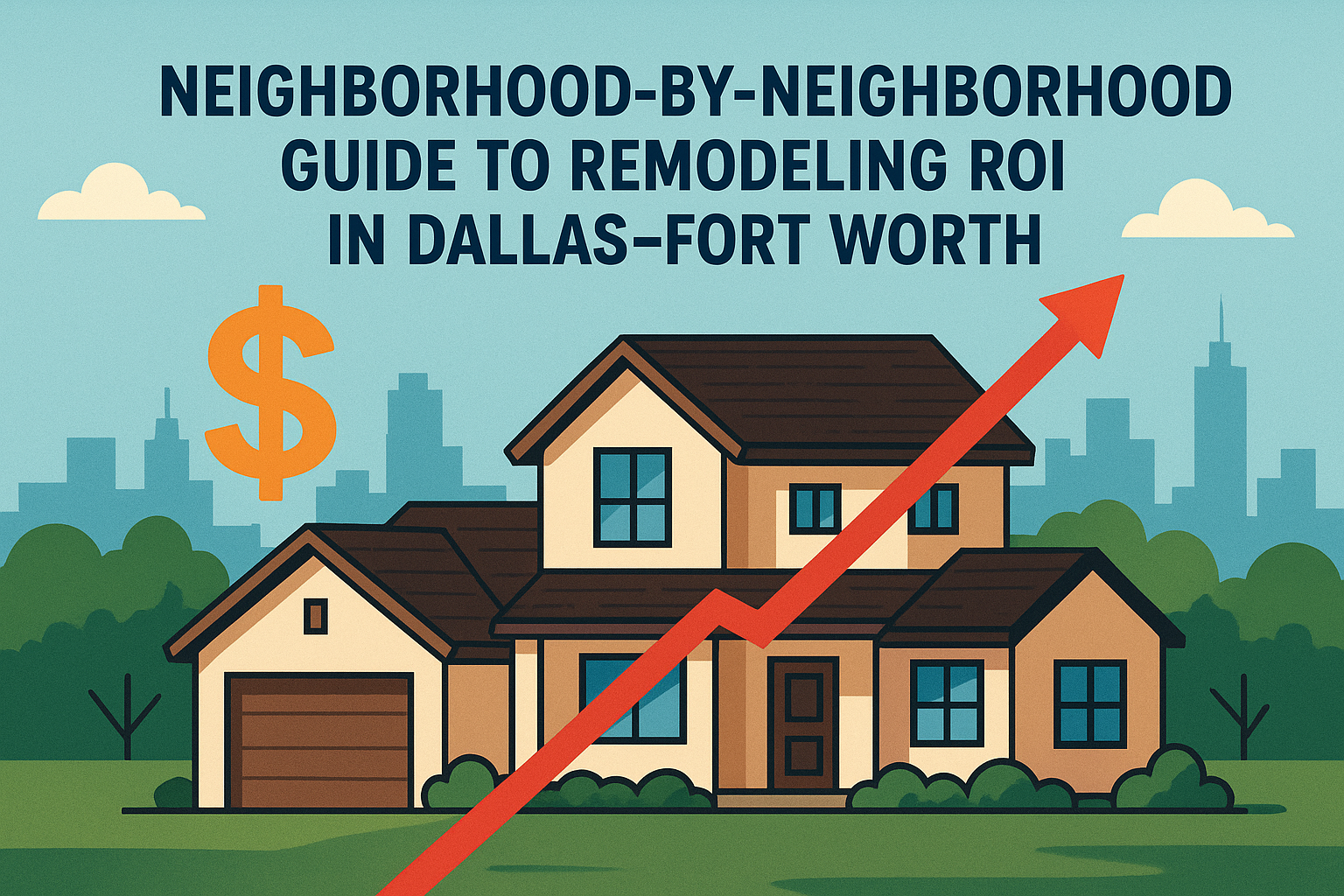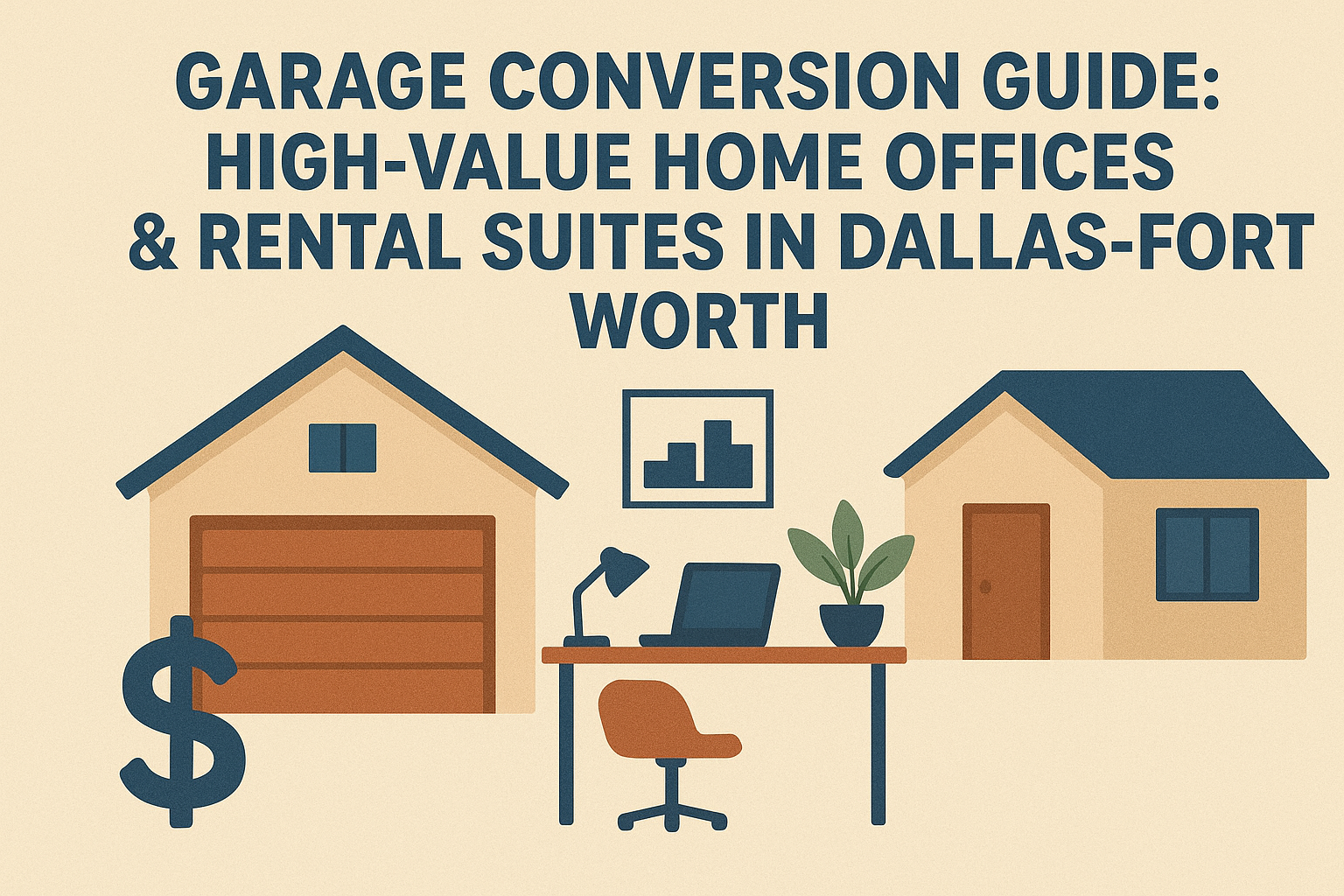Energy-efficient remodeling for Dallas–Fort Worth homes — upgrades, costs, rebates & timelines
High-impact energy-efficient remodeling for DFW homes: HVAC, insulation, windows, solar-ready roofing — costs, rebates, permits, timelines.

Introduction
Dallas Fort Worth homes face long, hot summers and a shifting regulatory and incentives landscape that makes energy-efficient remodeling both a homeowner comfort win and a strong resale-value play. This guide covers the best energy-efficient remodeling upgrades for Dallas–Fort Worth homes, neighborhood-specific recommendations, typical costs and timelines for HVAC, insulation, windows, and solar-ready roofing, how to access local rebate and tax-incentive opportunities (including federal credits), and practical, step-by-step contractor coordination tips for permits and final inspection scheduling in DFW.
Why energy-efficient remodeling is a great investment in DFW
- Lower utility bills: Upgrades tailored to North Texas climate — efficient cooling, duct sealing, attic insulation, and shading — reduce summer cooling load and monthly costs.
- Higher resale value: Buyers increasingly reward homes with verified energy improvements (HERS/EnergyScore), especially in DFW neighborhoods with rising energy costs.
- Comfort & indoor air quality: Proper insulation, balanced HVAC, and better windows stabilize indoor temperatures and reduce drafts.
- Incentives available: Federal tax credits for renewable energy (solar) and evolving efficiency rebates make upgrades more affordable. Locally, many utilities and municipalities offer rebates or incentives — check DSIRE and your utility’s program pages.
How to think about search intent and this guide
This article answers the informational and commercial intent of homeowners and real-estate-minded readers: what upgrades work best, how much they cost, where to get rebates, and how to manage contractors and permits in Dallas and Fort Worth. If your intent is transactional (hire a contractor or apply for incentives), use the neighborhood recommendations and the contractor coordination steps below.
High-impact remodeling projects for DFW — overview of priorities
- HVAC upgrades and duct work (energy-efficient HVAC DFW)
- Attic and wall insulation (home insulation Dallas; home insulation benefits)
- Energy-saving window replacement (energy-saving windows)
- Solar-ready roofing and solar prep (solar-ready roofing Dallas; solar roofing Texas)
- Complementary measures: LED lighting, smart thermostats, whole-home air sealing, and ventilation.
Explore related services: DFW remodeling design services, full home remodeling, and recent projects.
Neighborhood-by-neighborhood recommendations (quick guide)
Note: These recommendations assume you want to preserve resale value and lower utility bills for the local buyer pool. Tailor choices to property age, style, and HOA requirements.
- Central Dallas (Highland Park, Uptown, M Streets, Oak Lawn)
- Typical homes: mix of older masonry and newer infill.
- High-impact projects: window replacement with high-performance frames (preserve architectural appearance), attic insulation boost, duct sealing, high-efficiency heat pump systems.
- Resale note: Buyers in these neighborhoods appreciate efficiency + historic character. Use energy-efficient windows that match the look.
- East Dallas / Lakewood / White Rock
- Typical homes: mid-century and 1980s houses with older HVAC and thin insulation.
- High-impact projects: attic insulation (dense-pack or blown-in), replacing aging AC with high-SEER heat pump, whole-house air sealing.
- Oak Cliff / Bishop Arts / Kessler
- Typical homes: older bungalows.
- High-impact projects: insulation upgrades (attic and rim-joist), duct repair and replacement, energy-saving windows where appropriate, mini-split systems for additions.
- Resale note: Document improvements with an energy audit to attract buyers.
- Plano / Frisco / McKinney (North suburbs)
- Typical homes: newer construction, larger footprints.
- High-impact projects: solar-ready roofing or integrated solar + battery-ready in high-value homes, upgraded HVAC to variable-speed heat pumps, smart-home HVAC controls.
- Resale note: Suburban buyers value lower bills and solar-ready systems.
- Southlake / Colleyville / Westlake
- Typical homes: premium builds with high expectations.
- High-impact projects: solar-ready/solar + battery systems, high-performance windows, deep insulation packages, zoning and smart controls.
- Resale note: Net-zero ready features increase marketability.
- Fort Worth (TCU area, West 7th, Arlington)
- Typical homes: mix of older and new builds.
- High-impact projects: attic insulation, duct sealing, HVAC replacement with high-SEER systems, roof assessments for solar suitability.
- Resale note: Energy improvements can differentiate listings in competitive Fort Worth neighborhoods.
- Older suburbs (Irving, Grand Prairie, Mesquite)
- Typical homes: 1970s–1990s builds with aging HVAC and envelope.
- High-impact projects: HVAC replacement, window upgrades (where ROI is realistic), insulation improvements, and attic ventilation fixes.
Deep dive: Top projects with costs, timelines, and benefits
1) HVAC replacement and optimization (energy-efficient HVAC DFW)
- Why: In DFW, HVAC is often the largest energy expense. Replacing a 10–15 year old unit with a high-SEER heat pump or AC can cut cooling bills 20–40% and improves comfort.
- Typical costs (DFW ranges): $3,500–$10,000 for conventional high-efficiency split AC; $7,000–$20,000 for full heat-pump systems or multi-zone heat pumps. Adding zoning or variable-speed systems increases cost.
- Timeline: 1–4 days for replacement; allow 2–6 weeks for contractor scheduling; permit and inspection process can add 1–2 weeks depending on city workload.
- Considerations: Proper sizing (Manual J), duct sealing and balancing, and installing a programmable or smart thermostat (Nest, Ecobee) for immediate payback.
- Rebates & incentives: Many utilities and retailers offer rebates for high-efficiency equipment or qualifying installations; federal tax credits and energy-efficiency incentives may apply — confirm eligibility before purchasing.
- Practical tip: Get a home energy audit and duct leakage test first; often duct losses are the low-hanging fruit.
2) Attic and wall insulation (home insulation Dallas; home insulation benefits)
- Why: Attic insulation and air-sealing are among the highest ROI measures, especially in older DFW homes with low R-values. Improved insulation reduces peak cooling load.
- Options: blown-in cellulose/fiberglass for attics; sprayed or dense-pack cellulose for walls; adding spray foam to rim-joists for air sealing.
- Typical costs: Attic insulation top-up: $1,000–$4,500 depending on square footage and target R-value. Wall insulation (retrofit) costs vary widely — $2,500–$8,000+ for dense-pack walls in older homes.
- Timeline: 1–3 days for attics; wall retrofits 1–3 days per section; full home insulation retrofits take longer.
- Rebates: Insulation may qualify for energy-efficiency tax credits or local rebates — check utility programs and federal credits.
- Practical tip: Pair insulation upgrades with a blower-door test pre/post to quantify improvement.
3) Energy-saving windows (energy-saving windows; energy-efficient window replacement benefits and costs in Dallas)
- Why: Windows affect comfort and solar heat gain. In DFW, look for low-E coatings, double-pane gas-fill, and frames with thermal breaks.
- Typical costs: $400–$1,200+ per window depending on size, glass package, and frame material; whole-home replacement often $8,000–$25,000.
- Timeline: 1–5 days for most homes; permit usually not required for like-for-like window replacement, but check historic districts.
- Resale impact: High if windows are energy-rated (NFRC) and backed by documentation.
- Practical tip: Prioritize the west- and south-facing windows and consider interior/exterior shading or awnings.
4) Solar-ready roofing and solar installations (solar-ready roofing Dallas; solar roofing Texas)
- Why: Solar panels paired with energy-efficient HVAC and insulation can drastically cut bills and appeal to eco-minded buyers.
- Solar-ready steps: roof inspection and repairs, upgrade underlayment to solar-friendly materials, ensure roof pitch and orientation are suitable, add conduit paths for future panels, and design roof with load considerations.
- Typical costs: Roof replacement to make solar-ready: $5,000–$15,000 depending on roof size and materials. Solar installation (before incentives): $15,000–$35,000 for average DFW home (varies with system size).
- Timeline: Roof replacement 2–10 days; solar installation 1–5 days; permit and interconnection approvals add 2–8 weeks.
- Incentives: Federal Residential Clean Energy Credit (percentage-based) is a major incentive for solar; local utility interconnection rebates or performance-based incentives sometimes available. Check DSIRE and local utility pages.
- Practical tip: If your roof is older than 8–12 years, prioritize roof replacement with solar readiness before panel installation to avoid removing panels for roofing later.
| Project | DFW typical costs | Typical timeline | Key incentive notes |
|---|---|---|---|
| HVAC replacement/optimization | $3,500–$20,000 | 1–4 days (+2–6 weeks scheduling) | Utility rebates; federal credits may apply |
| Attic insulation (top-up) | $1,000–$4,500 | 1–3 days | Utility rebates; federal credits |
| Wall insulation (retrofit) | $2,500–$8,000+ | 1–3 days per section | Check utility programs; federal credits |
| Energy-saving windows | $8,000–$25,000 (whole-home) | 1–5 days | Some utility rebates; NFRC-rated recommended |
| Solar-ready roofing | $5,000–$15,000 | 2–10 days | Prepare for future solar incentives |
| Solar installation | $15,000–$35,000 | 1–5 days (+2–8 weeks approvals) | Federal Residential Clean Energy Credit |
Working with contractors in Dallas–Fort Worth: vetting, permits, and scheduling (contractor coordination Dallas; permit scheduling Dallas; final inspection tips)
Step 1 — Vet and select contractors
- Licensing & registration: Verify HVAC contractors with Texas requirements (e.g., HVAC technicians and contractors may need TDLR registration; confirm licensing appropriate to trade). Roofing contractors must be properly insured and ideally have manufacturer certifications (GAF, CertainTeed).
- Insurance & bonds: Confirm general liability, workers’ comp (if applicable), and bonding.
- References and portfolios: Request recent local references and on-site photos. Ask for HERS or audit documentation for past energy remodels.
- Written scope & change orders: Get detailed line-item quotes, expected timeline, and payment schedule.
Related reading: reliable and cost-effective remodeling company in Dallas–Fort Worth.
Step 2 — Determine who pulls permits
- Best practice: Let the licensed contractor pull permits (they know local codes), but confirm the contractor will provide permit numbers and post required documents.
- Permit types in Dallas and Fort Worth: HVAC, electrical (for solar), mechanical, and roofing permits are commonly required. Window replacements may not need permits if like-for-like, but always check with the local building department.
- Timeline: Permit review can take days to a few weeks. For faster turnaround, prepare full documentation (drawings, load calculations, equipment specs).
Step 3 — Schedule inspections and final walkthroughs
- Coordinate inspection windows: Cities typically have online portals (Dallas Development Services, Fort Worth ePermits) for scheduling. Book inspections early — especially in summer when loads are high and inspectors are busy.
- Pre-inspection checklist for homeowners: Ensure site is safe, clear pathways for inspectors, equipment tags accessible, and documentation (compliance certificates, test results) available.
- Final inspection tips: Require final documentation and an inspection report showing pass status. Hold final payment until you receive the final CO or inspection approval if contract allows.
Step 4 — Rebate and tax credit coordination
- Pre-approval vs post-install: Some incentive programs require pre-approval; others accept post-installation applications. Don’t assume all rebates are claimed after the fact — check program rules.
- Paperwork: Collect receipts, equipment model numbers, contractor invoices, compliance certificates (e.g., ENERGY STAR, HERS) and inspection sign-offs for rebate applications.
- Tax credits: For solar, the federal Residential Clean Energy Credit typically requires tax documentation and proof of purchase and installation. Consult a tax advisor for eligibility and timing.
Home energy audit DFW: what to expect (home energy audit DFW)
- Types of audits: basic walk-through (visual), diagnostic audit (blower door + infrared), and comprehensive tests (duct leakage, combustion safety).
- Typical cost & timeline: $300–$700 for a diagnostic audit in DFW; same-day or 1–3 hour visits with a written report following.
- Use the audit to prioritize investments (typically attic sealing/insulation, duct sealing, HVAC tune-up, then windows or solar).
Plan your audit and upgrades with DFW design services for energy-efficient remodels.
Local rebate & tax-incentive resources (home energy rebates Dallas; Dallas energy rebates; tax credit and rebate eligibility)
- Federal incentives: Residential Clean Energy Credit (solar and battery systems) and other federal energy-efficiency tax credits may apply. Check the IRS and consult a tax professional for specifics and eligibility.
- State & local incentives: Texas does not have a single statewide incentive program like some states, but many local utilities and municipalities in DFW provide rebates for efficient HVAC, smart thermostats, insulation, and roofing upgrades. Use DSIRE and your utility’s efficiency program pages (Oncor, TXU Energy, CoServ, Denton Municipal Electric, etc.) to find current offerings.
- Utility rebates often require pre-approval or specific contractor participation — confirm requirements before work starts.
- Example local items to search for: residential HVAC rebates, attic insulation rebates, window incentives, and solar interconnection/ performance-based incentives.
Practical checklist for a DFW energy remodel (step-by-step)
- Start with a home energy audit (diagnostic if possible).
- Prioritize low-cost, high-return fixes (air sealing, attic insulation, duct sealing).
- Get 3 bids from qualified contractors (include any licensing and rebate eligibility in scope).
- Confirm who pulls permits and the expected permit review timeline.
- Check incentives and whether pre-approval is required; submit applications if needed.
- Schedule contractors with adequate buffer for city inspections.
- Document everything (receipts, model numbers, inspection reports).
- Schedule final inspection and walk-through; collect warranties and compliance documents.
Energy-saving windows vs insulation vs HVAC: where to spend first for best ROI
- First priority (typically highest ROI): air sealing and attic insulation (home insulation benefits). These reduce load and improve HVAC performance.
- Next: duct sealing/repair and HVAC efficiency upgrades (energy-efficient HVAC DFW).
- Then: windows (especially if single-pane or failing); windows often have good long-term value but higher upfront cost.
- Solar/solar-ready roofing: best after envelope and HVAC are optimized. Solar adds high resale appeal in suburbs but requires a roof in good condition.
Financing options and cost-saving strategies
- Financing: Contractor financing, home equity lines, PACE programs in some jurisdictions, and home energy loans.
- Bundle improvements: Doing insulation, duct sealing, and a high-efficiency HVAC together often provides the most cost-effective route.
- Rebates & net costs: Always calculate after-incentive costs and expected annual energy savings to determine payback period.
Real-world case examples (short)
- Case A: 1950s bungalow in Oak Cliff upgraded attic insulation, sealed ducts, and replaced a 15-year-old AC with a 16-SEER heat pump. Result: 30% reduction in cooling bills and increased buyer interest when listed three months later.
- Case B: 2005 suburban home in Frisco prepared roof and installed 7.5 kW solar panels after upgrading to a high-efficiency HVAC. Result: long-term electric bill reduction and marketing advantage to eco-minded buyers.
Permitting nuances in Dallas and Fort Worth (permit scheduling Dallas; final inspection tips)
- Dallas: Use Dallas Development Services or the city permit portal for residential mechanical, electrical, and roofing permits. Some window work is exempt when like-for-like; confirm before proceeding.
- Fort Worth: Use Fort Worth’s ePermits system. Solar and electrical work typically require electrical permits and must be inspected before interconnection.
- Inspection scheduling tip: In high-demand seasons (summer), schedule inspection windows early and maintain communication with the inspector if you need to reschedule.
- Final inspection tip: Keep contractors present for the inspection to address minor punch-list items on the spot.
How to find qualified contractors for energy-efficient home upgrades in Dallas
- Check manufacturer certifications (for roofing and HVAC) and local trade organizations.
- Use local references, recent project photos, and ask for HERS ratings or audit documentation from prior jobs.
- Confirm warranty terms (workmanship vs factory warranty).
- Use community resources like neighborhood social groups, Nextdoor, and local realtors for referrals.
See what others say: homeowner testimonials and DFW project portfolio. Check DFW remodeling FAQs.
Authoritative resources & tools
- DSIRE (national database of incentives)
- ENERGY STAR and DOE Home Energy Score resources
- Local city permit portals (Dallas Development Services, Fort Worth ePermits)
- Local utility rebate pages (search Oncor, TXU Energy, CoServ, Denton Municipal Electric)
Expert insight
Local energy auditors and contractors in DFW consistently report that the single most overlooked, high-impact measure is duct sealing combined with attic air sealing. Because much of DFW housing stock was built before modern envelope standards, addressing the building shell before splurging on high-end windows or solar yields the fastest payback.
Author bio
Author: Forge Legacy DFW, Remodeling & Building Materials Specialist (15+ years)
I have 15 years of experience advising homeowners and renovation teams in the Dallas–Fort Worth area on durable, energy-efficient materials and contractor selection. I regularly consult on roofing, siding and exterior systems to balance cost, aesthetics and long-term performance in Texas climates. I hold continuing education in building science and have worked with local manufacturers, distributors and licensed contractors across DFW.
Internal linking & next steps
For a tailored remodeling plan, rebate assistance, or contractor coordination services, consult with local specialists. To learn how projects can be coordinated and documented for best resale impact, consider resources and services from Forge Legacy. Visit Forge Legacy to explore how to combine audits, contractor vetting, and documentation to maximize resale value and energy savings. (internal link: /forge-legacy)
Closing checklist for homeowners (quick reference)
- Book an energy audit (home energy audit DFW).
- Prioritize air sealing and attic insulation.
- Get 3 bids for HVAC replacement with Manual J sizing.
- Verify contractor licensing and permit responsibilities.
- Check DSIRE and utility pages for Dallas energy rebates and local incentives before work starts.
- Keep detailed records for rebates and tax credits.
- Schedule final inspections and collect final reports to show prospective buyers.
Final recommendations and call to action
Energy-efficient remodeling in Dallas–Fort Worth offers measurable savings, improved comfort, and strong resale advantages — especially when projects are prioritized correctly, local incentives are leveraged, and permit/inspection logistics are handled proactively. If you want expert support coordinating audits, contractor vetting, and documentation to maximize resale value and lower utility bills, check out Forge Legacy for assistance with energy-efficient remodeling planning and execution. Visit Forge Legacy to get started: /forge-legacy
Quick reference summary
- Highest ROI: attic insulation + air sealing + duct sealing
- Biggest monthly savings: HVAC upgrade to high-efficiency heat pump
- Best long-term value add: documented energy upgrades (audits, HERS, solar-ready roof)
- Useful resources: DSIRE, ENERGY STAR, city permit portals
- For contractor coordination and rebate guidance, Forge Legacy is a recommended partner: /forge-legacy
End note: keep documentation (receipts, model numbers, inspection reports) handy for resale marketing — buyers respond well to verified energy improvements.
Author bio
Author: Forge Legacy DFW, Remodeling & Building Materials Specialist (15+ years)
I have 15 years of experience advising homeowners and renovation teams in the Dallas–Fort Worth area on durable, energy-efficient materials and contractor selection. I regularly consult on roofing, siding and exterior systems to balance cost, aesthetics and long-term performance in Texas climates. I hold continuing education in building science and have worked with local manufacturers, distributors and licensed contractors across DFW.
Citations and helpful official links
- DSIRE energy incentives database
- IRS Residential Clean Energy Credit
- ENERGY STAR
- DOE Home Energy Score
- City of Dallas Building Inspections
- City of Fort Worth Development Services
- Oncor Energy Efficiency Programs
- TXU Energy rebates
- CoServ residential rebates
- Denton Municipal Electric rebates
- Remodeling services in DFW
- DFW remodeling blog
- Dallas–Fort Worth remodeling projects
- DFW service areas
- Contact a Dallas–Fort Worth remodeler


